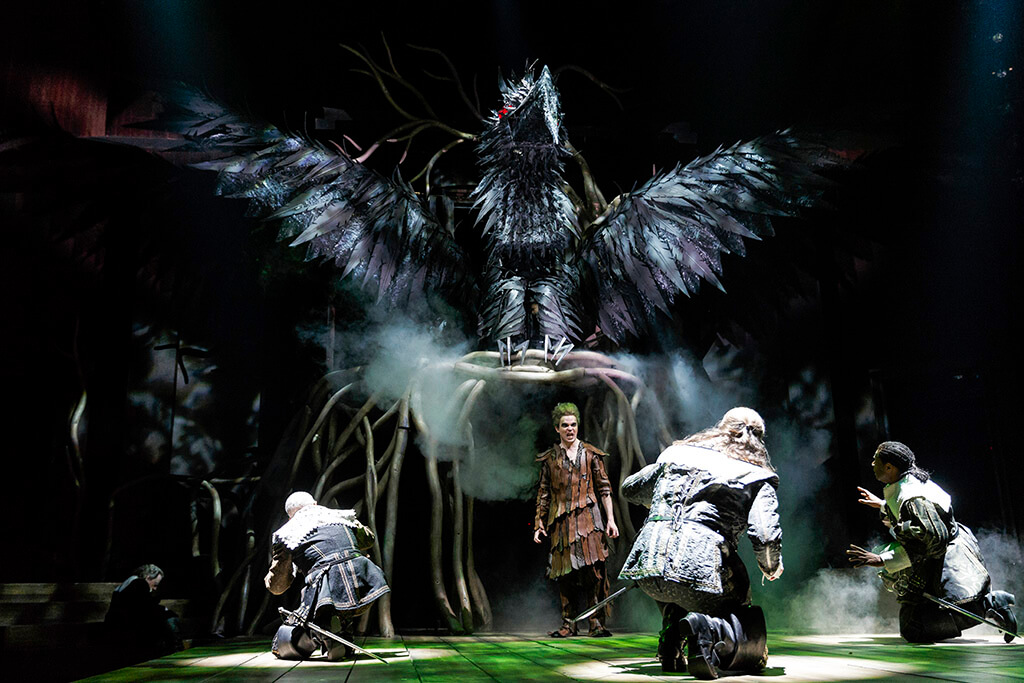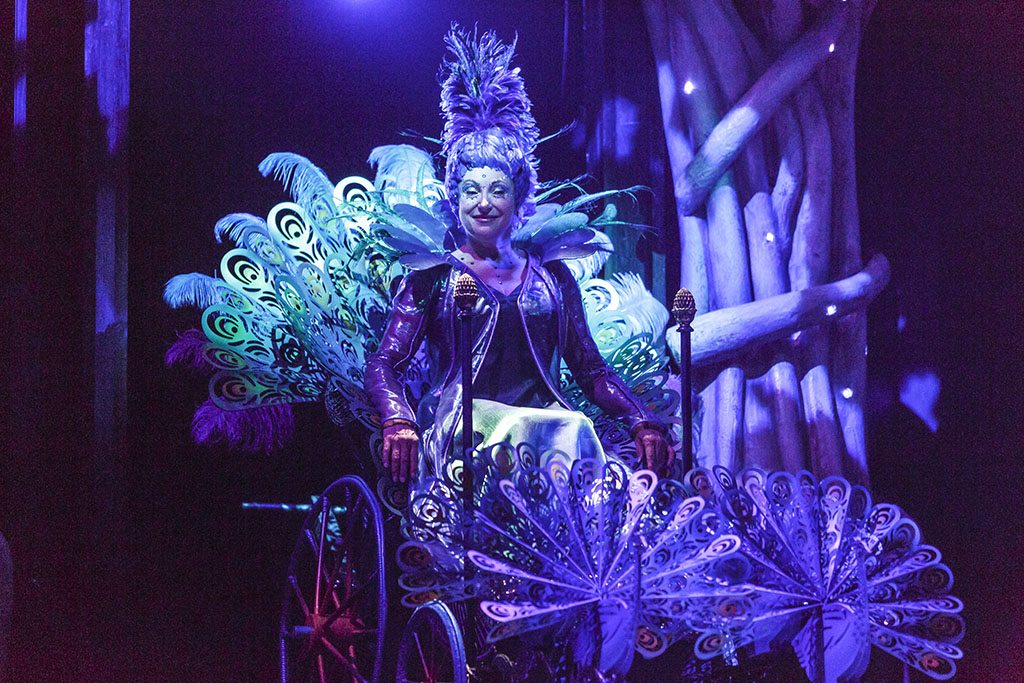
Stratford Festival 2018: The Tempest by William Shakespeare, directed by Antoni Cimolino, Festival Theatre, May 10 to Oct. 26. Tickets available at 1-800-567-1600 or www.stratfordfestival.ca
STRATFORD — Any production of Shakespeare’s The Tempest has to showcase the elements of magic and the glory of the language. The play is, after all, thought to be the Bard’s last, and therefore, a testament to his art. Without the visual and verbal canvas that underlines the sweep of Shakespeare’s imagination, there is no play. Happily, director Antoni Cimolino gives us both, and having the great Martha Henry as Prospero is inspired casting.
This very worthy production rests on four theatrical pillars — the director’s service to the playwright, the depth of the character portrayals, the lighting and the music, with the latter two contributing mightily to the visualization of the magic. Admittedly, the play does flag in the long second half (comprising of Acts Three to Five), but that is not the fault of the production. Shakespeare needed a good editor. The scenes and speeches in Act Three, in particular, do run on and could have stood some judicious cutting.
Cimolino as a director has usually been associated with good taste. He rarely attempts to be over-clever or play auteur. His approach to The Tempest is to render Shakespeare’s version, and certainly not any radical interpretation of his own. Thus, designer Bretta Gerecke’s costumes are set in the cavalier times of the early 17th-century. Her clothing for the spirits and monsters is fanciful but not outrageous. For example, Ariel (André Morin) is in a lamé, puffed-sleeved tailcoat, and sports a windswept hairdo, while Caliban (Michael Blake) wears brief shorts and a jerkin with a ridged back to hint at deformity. Everything is in proportion. The set piece on the Festival Theatre’s thrust stage is an ancient tree with gnarled roots that hide the opening to Prospero’s cell. The palette, for the most part, is dark or subdued. Gerecke’s saves her riot of colour and opulence for the three goddesses (Iris, Ceres and Juno, portrayed by Chick Reid, Alexis Gordon and Lucy Peacock) who gorgeously burst onto the stage in the Act Four masque.

In terms of character, The Tempest lends itself to superficial acting because Shakespeare lays everything out in his superb text. By words alone, we know who the characters are, what they are doing, and why they are doing it. Cimolino’s production, however, is distinguished by deeper characterizations, beginning with Martha Henry, who is one of this country’s greatest actors. She can convey more meaning with one word than other actors can do with whole phrases. One of the joys of this production is hearing her delicious play with language, and the myriad of moods, emotions and complexities she brings to Prospero. After her majestic conjuring up of the storm that brings her enemies to her island, she arrives on the stage filled with restless energy, almost giddy with the excitement of imminent revenge. Her Prospero may be a powerful magician, but she is also a mercurial personality who can change temperament on a dime — quick to anger, quick to love, both vain and pompous, yet imbued with a deep compassion — all of which come tumbling out of a cauldron of intellect and insight.
If I have one quibble with the casting of a woman as Prospero, (and it is the old historian in me coming out), it is this — if Prospero as Duke of Milan has a brother who usurped her, why did a brother not take precedent in being heir to the throne over a sister? And the backstory I had to think up to justify this? Antonio is her half-brother, same mother, different father. He would never have been a direct heir. And a note — in talking to my friends and acquaintances, I seem to be the only one who thought of this question.
As the all-important spirit Ariel, Morin is at once commanding and feisty. He is not Prospero’s mere underling, and, pardon the pun, he is a spirit who shows spirit. Ariel wants his freedom and he is going to get it. Morin also has a beautiful singing voice. Michael Blake as Caliban has finally been given a role that shows the true range of his talents. (Full disclosure, I’ve known Michael since he was a teenager.) His character is not a predictable monster by any means, and while Blake’s Caliban certainly has his baser urges, he is also capable of poetic flights of fancy (as when he talks about the beauty of the island’s inherent music). Caliban’s desire for freedom from Prospero’s enslavement of him is downright poignant. As for the young lovers, Miranda, Prospero’s daughter (Mamie Swettler) and Ferdinand, King Alonso’s son (Sébastien Heins), they do give charming performances and hold their own amid the awesome talent that surrounds them, but in truth, they are the least interesting and most routine characters in a play that boasts a magician, villains, clowns and supernatural beings.

Cimolino has cast some of Stratford’s strongest actors in secondary roles, which adds depth and breadth to their portrayals. As the arch-villains, Prospero’s brother Antonio (Graham Abbey) and King Alonso’s brother Sebastian (André Sills), the two convey an evil presence worthy of dark performances in any of Shakespeare’s tragedies. Similarly, the drunken butler Stephano (Tom McCamus) and the hapless jester Trinculo (Stephen Ouimette) who together play Caliban for a fool, are not mere toss-away clowns. There is substance underlying how they are coping on a deserted island after the shipwreck. They get their laughs, but there is angst in the mix. Kudos also to David Collins as the grieving father Alonso, King of Naples. He might have helped Antonio usurp Prospero, but his power-grabbing past is offset by his despair. And how nice it is to have Rod Beattie back on the Stratford stage as the ever-optimistic Gonzalo, Alonso’s counsellor.
Michael Walton’s detailed lighting is a wonder, from the tiny blue fairy lights that announce Prospero’s magic, to the brilliantly coloured lanterns that glow mysteriously overhead, from the blazing red eyes of the harpy, to the atmospheric effects that transform the stage from the real to the surreal. Particularly effective is the use of individual spotlights to focus attention on one character, as opposed to the broad lighting that bathes the stage in the appropriate moods demanded by the script. The lighting cues come fast and furious, and are almost a character in their own right.
And finally, there is composer Berthold Carrière’s glorious cinematic music, partly atmospheric, partly narrative. He’s written lovely tunes for the songs Shakespeare embedded in the script, as well as turning other pieces of text into songs. His music for the three goddesses and a full chorus of spirits that concludes the masque approaches the magnificence of a Handel chorale. Cimolino has peopled the stage with a wealth of extra characters. For example, Ariel has his minions who follow him wherever he goes, and Carrière has given them lovely humming choruses. Shakespeare tells us through various characters that Prospero’s island is imbued with mysterious and beautiful music, and the composer has provided the reality of that truth.
Would I recommend this production? The Tempest can be a hard slog for people unfamiliar with the special structure of the play, which is one of vignettes and episodes rather than action. I’d be careful about sending people who might think it’s a bore. For others who would embrace the enchantment of Cimolino’s “this rough magic” and “brave new world”, my answer would be a hearty yes.
- INTERVIEW | Actor Diego Matamoros Takes On Icon Walt Disney In Soulpepper Production Of Hnath Play - April 16, 2024
- SCRUTINY | Opera In Concert Shine A Light On Verdi’s Seldom Heard La Battaglia Di Legnano - April 9, 2024
- SCRUTINY | Lepage & Côté’s Hamlet Dazzles With Dance And Stagecraft Without Saying Anything New - April 5, 2024



